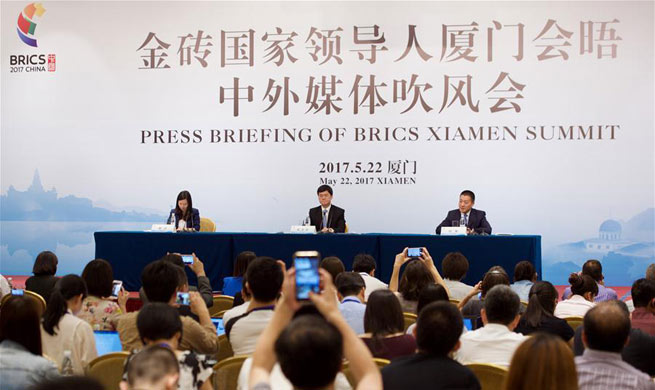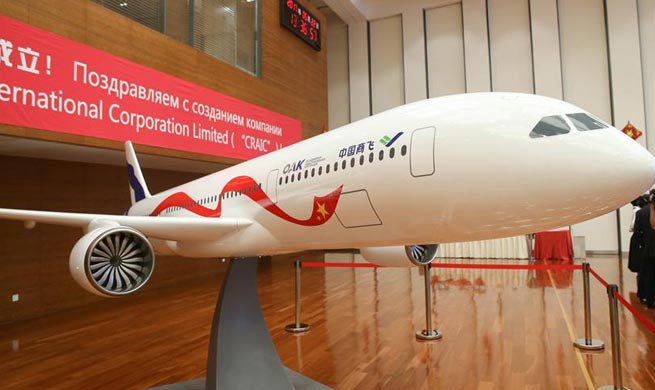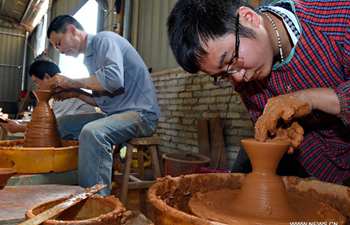by Osama Radi, Emad Drimly
RAMALLAH, May 22 (Xinhua) -- The ongoing visit of U.S. President Donald Trump to the Middle East, mainly to Israel and the Palestinian territories, could be a start for launching a new peace process between the Israelis and the Palestinians, according to analysts.
Trump started his tour in Saudi Arabia on Saturday, and held meetings with leaders of Arabic, Islamic and Gulf states. It's his first tour in the Middle East since he won the presidential elections and took office in the White House in January.
He arrived in Israel on Tuesday and will visit Palestinian city of Bethlehem on Wednesday. He'll meet with Israeli Prime Minister Benjamin Netanyahu and Palestinian President Mahmoud Abbas respectively.
Mohamed Daraghmeh, a writer and political analyst from the West Bank, told Xinhua that Trump's visit in the region is "to preserve the American interests, including military, economic and political aspects, as well as creating a coalition against Iran and against the Sunni terrorism in the region, besides backing Israel."
"I believe that Trump is seeking a guarantee to achieve stability in the region throughout the file of the Israeli-Palestinian conflict by launching a new peace process to control the situation in the region and fill in the gaps to avoid an explosion in the region," said Daraghmeh.
The prominent analyst expected that Trump "would launch a political process between Israel and the Palestinians based on new basics that has this time an element of regional support with an active American role for all parties and an attempt to reach new deals in all outstanding issues."
He also expected that Trump would ask for 18 months for new talks between Israel and the Palestinians, adding "Washington might also run the conflict in the region throughout making important economic improvement rather than reaching a permanent solution to the conflict."
Trump received Abbas in the White House on April 3 and vowed that he will work hard on reaching a peace agreement between Israel and the Palestinian. Before meeting with Abbas, Trump also spoke with leaders in the Arab region.
Trump may want to gradually implement the Arab Peace Initiative issued in 2002, and this means an Arab normalization with Israel that goes in parallel with moving up the stalled peace process.
The Arab Peace Initiative aims at establishing a recognized Palestinian state on the territories Israel occupied in 1967, the return of Palestinian refugees and a full Israeli withdrawal from the Syrian Golan Heights for full recognition and normalization with Israel.
Rajab Abu Seryyah, a writer and political analyst, told Xinhua, "So far, Trump still puts all his eggs in the Israeli basket, therefore leaders of Arab states are trying to attract Israel by spreading the idea of gradual normalization with Israel," adding "now, commercial normalization with Israel is significant before talking about the Palestinian cause."
Palestinian officials had earlier stated they are willing to accept a regional solution sponsored by the United States but should be based on the Arab initiative. The last peace talks, sponsored by the United States, stopped in April 2014, after it went on for nine months without achieving any significant breakthrough.
Hani al-Masri, director of the Palestinian Center for Policy Research and Strategic Studies, warned that "the Palestinian side should be careful, not to give the priority of recognizing the U.S. leadership and its role on the expense of the Palestinian rights, and make concessions on the previous requirements to ensure the success of a serious peace process with Israel."
"I don't think that Trump would recognize the Palestinians right of self determination," al-Masri told Xinhua, adding "Europe recognized this right in 1982, and that the last two U.S. presidents recognized the right of the Palestinians to have a state."
He stressed that the Palestinian cause "needs a new approach that bets on the Palestinian people first and foremost, and to promote its strengths and the justice of the Palestinian cause, and to address the essence of the conflict in the region."

















